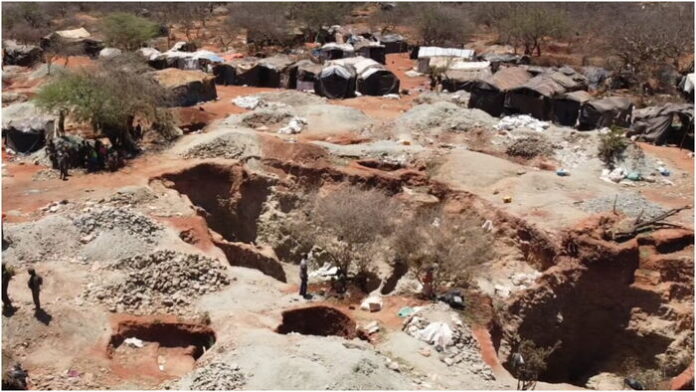Ten miners are feared dead after a section of Hillo gold mines in Dabel, Marsabit County, collapsed on Tuesday. Seven bodies have been recovered so far, according to Dabel Location Chief Ibrahim Dube, with the rescue mission still underway.
According to reports, despite the closure of the mines in March this year after 13 people died, mining continued allegedly aided by security officers deployed to guard the area.
A resident revealed that 10 individuals had sneaked into the restricted area when the tragedy occurred. “So far, there is no survivor. We fear that the 10 people are dead,” the resident who sought anonymity said.
Marsabit County Commissioner James Kamau did not confirm the number of people who had died, saying he did not have first-hand information. He promised to give full information after arriving at the site.
“I’m not able to make any confirmation based on hearsay unless I get to the scene,” he said.
The incident casts a shadow on the government’s recent announcement to reopen the mines for regulated commercial operations.
During a visit to Moyale on December 3, 2024, Principal Secretary for Mining Elijah Mwangi outlined plans to resume legal mining after implementing new regulations, adding that he would also give an update on the recovery efforts.
Among the measures, the government has ordered the backfilling of open mine pits, which was scheduled to begin this week.
“We have given instructions that refilling of all the gaping gold mine pits should be done before the sites are reopened,” Mwangi said.
This process, expected to last a month, aims to enhance safety and prepare the mines for mechanised operations. Mwangi emphasised that the backfilling would prevent further accidents, such as the recent collapse.
The reopening plan follows extensive consultations between government officials, mining cooperatives, and local communities.
A Memorandum of Understanding (MoU), was signed to ensure transparency and equitable resource sharing.
Each artisanal group will be assigned a maximum of 5km square mining area after securing 5 years of mining permits while miners will be required to commercialise mining activities and ensure they are sustainable.
Stricter regulations will also be enforced, requiring gold processors and buyers to register with the Mining Office or face heavy penalties, including a Sh10 million fine or five years in prison.
A special mining police unit will be deployed to oversee operations and curb illegal activities.
The government’s reforms aim to create a safer, more sustainable mining environment while prioritising local communities’ involvement.



















